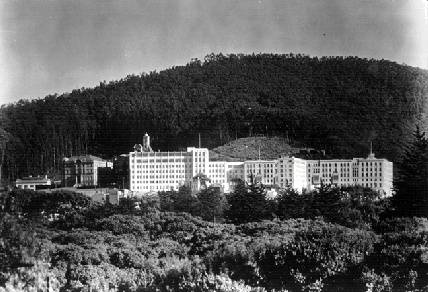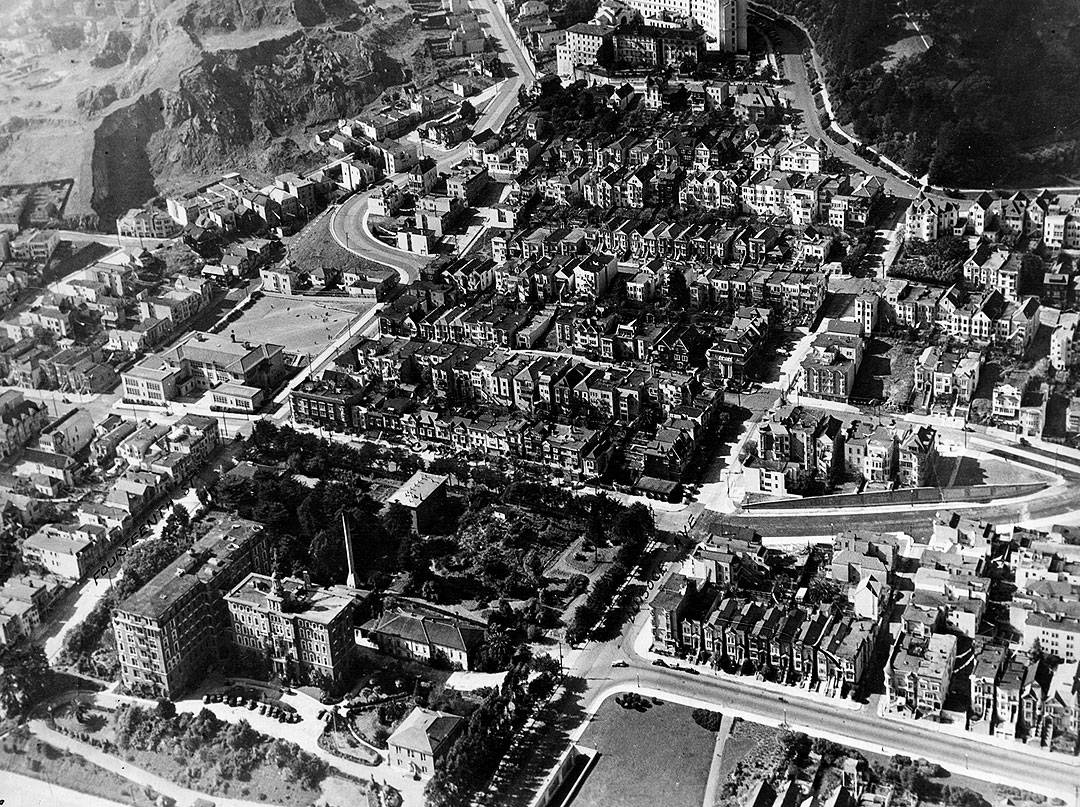The Medical Industry: Difference between revisions
m (1 revision(s)) |
mNo edit summary |
||
| Line 5: | Line 5: | ||
The principle forces at work in the Haight-Ashbury, other than the daily lives of the working class, have been the major health institutions that literally define the perimeter of the neighborhood: The University of California at San Francisco, situated on the southwest corner; St. Mary's Hospital on the northwest corner; Harkness Hospital (or Southern Pacific Hospital) on the northeast corner; and St. Joseph's, just behind Buena Vista Park on what would be the southeast corner. | The principle forces at work in the Haight-Ashbury, other than the daily lives of the working class, have been the major health institutions that literally define the perimeter of the neighborhood: The University of California at San Francisco, situated on the southwest corner; St. Mary's Hospital on the northwest corner; Harkness Hospital (or Southern Pacific Hospital) on the northeast corner; and St. Joseph's, just behind Buena Vista Park on what would be the southeast corner. | ||
In the 1960s and through the 1970s these health institutions were engaged in major expansion plans that had an extraordinary impact on the daily lives of Haight Ashbury residents, many of whom were employed by the hospitals. St. Mary's and UCSF were the two largest hospitals of their type west of the Mississippi (UCSF was the largest university hospital; St. Mary's, the largest religious hospital). Both were licensed for in excess of 600 beds. The UCSF had a total day time population of about 10,000 people, the vast majority of which commuted every day, thus the demand for a [[Freeways trashed by 89 quake freeway]], and a freeway offramp in Golden Gate Park. St. Mary's at the time had about 4 to 5,000 daily visitors. Harkness Hospital at Fell and Baker had substantially less, but nevertheless boasted a bed count of about 200 and a staff of about 400. St. Joseph's was about the same size as Harkness. | In the 1960s and through the 1970s these health institutions were engaged in major expansion plans that had an extraordinary impact on the daily lives of Haight Ashbury residents, many of whom were employed by the hospitals. St. Mary's and UCSF were the two largest hospitals of their type west of the Mississippi (UCSF was the largest university hospital; St. Mary's, the largest religious hospital). Both were licensed for in excess of 600 beds. The UCSF had a total day time population of about 10,000 people, the vast majority of which commuted every day, thus the demand for a [[Freeways trashed by 89 quake |freeway]], and a freeway offramp in Golden Gate Park. St. Mary's at the time had about 4 to 5,000 daily visitors. Harkness Hospital at Fell and Baker had substantially less, but nevertheless boasted a bed count of about 200 and a staff of about 400. St. Joseph's was about the same size as Harkness. | ||
''From a lecture by Calvin Welch at New College in Fall, 1994. '' | ''From a lecture by Calvin Welch at New College in Fall, 1994. '' | ||
| Line 13: | Line 13: | ||
'''Franklin Medical Center c. 1935, below Corona Heights''' | '''Franklin Medical Center c. 1935, below Corona Heights''' | ||
photos courtesy ''Gaar Collection, San Francisco, CA'' | |||
[[Haight Street 1944 |Prev. Document]] [[Redevelopment Hits the Haight |Next Document]] | |||
[[Haight Street 1944 Prev. Document]] | |||
Revision as of 17:09, 27 December 2007
UC Medical Center c. 1925, below Sutro Forest
The principle forces at work in the Haight-Ashbury, other than the daily lives of the working class, have been the major health institutions that literally define the perimeter of the neighborhood: The University of California at San Francisco, situated on the southwest corner; St. Mary's Hospital on the northwest corner; Harkness Hospital (or Southern Pacific Hospital) on the northeast corner; and St. Joseph's, just behind Buena Vista Park on what would be the southeast corner.
In the 1960s and through the 1970s these health institutions were engaged in major expansion plans that had an extraordinary impact on the daily lives of Haight Ashbury residents, many of whom were employed by the hospitals. St. Mary's and UCSF were the two largest hospitals of their type west of the Mississippi (UCSF was the largest university hospital; St. Mary's, the largest religious hospital). Both were licensed for in excess of 600 beds. The UCSF had a total day time population of about 10,000 people, the vast majority of which commuted every day, thus the demand for a freeway, and a freeway offramp in Golden Gate Park. St. Mary's at the time had about 4 to 5,000 daily visitors. Harkness Hospital at Fell and Baker had substantially less, but nevertheless boasted a bed count of about 200 and a staff of about 400. St. Joseph's was about the same size as Harkness.
From a lecture by Calvin Welch at New College in Fall, 1994.
Franklin Medical Center c. 1935, below Corona Heights
photos courtesy Gaar Collection, San Francisco, CA


